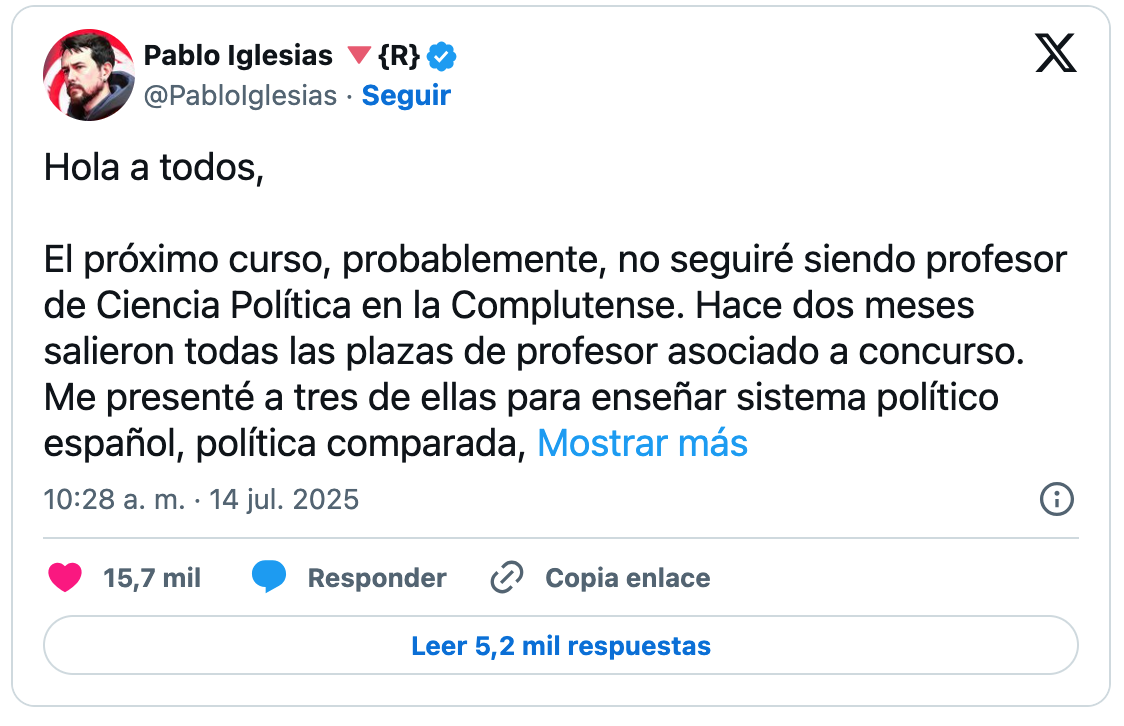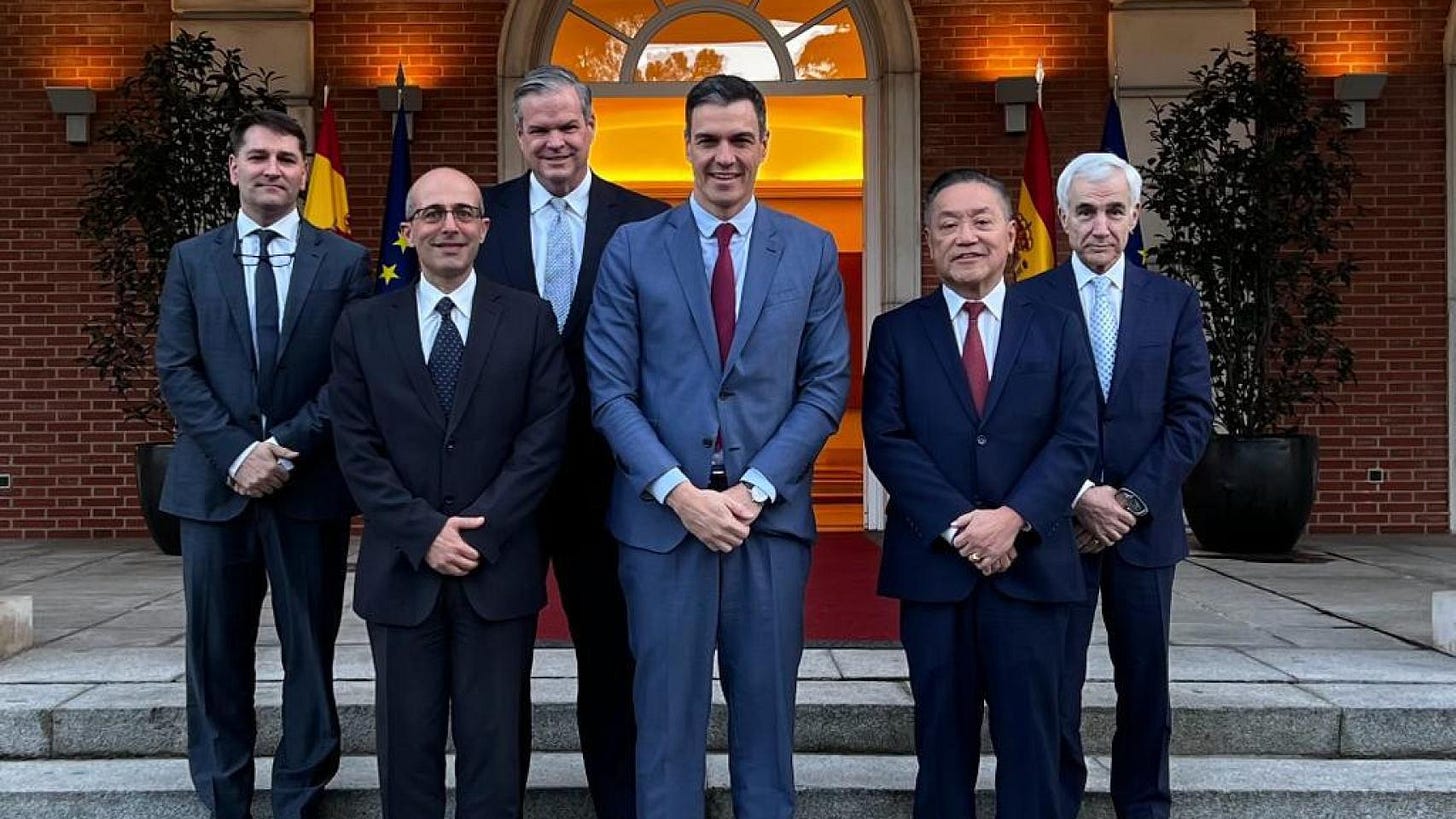💣 Far-Right vs. Immigrants in Murcia
Plus: Lamine Yamal has a naughty party, Pablo Iglesias lost a job, and Catalan tax deal sparks a revolt.
Madrid | Issue #111
🇪🇸 The Bubble is Spain's #1 English-language, bestselling newsletter. We offer paid subscriptions, and we’d be thrilled to have your support!
What’s going on in Torre Pacheco?
🐸 ‘Hunting immigrants’: Spain’s far-right is on the march
Torre Pacheco used to be a largely ignored agricultural town in Murcia. But over the last week, it’s become the epicenter of a national immigration controversy. What began as outrage over a brutal assault on a local retiree quickly spiraled into something much darker: xenophobic protests, far-right Telegram groups calling for immigrant “hunts,” and street battles.
First, some context. Torre Pacheco, population 40,000, is not a place many people outside Murcia have thought much about—until now.
The town is a textbook example of modern rural Spain: aging locals, sprawling vegetable greenhouses, and a large immigrant population (especially from Morocco) that forms the backbone of its workforce.
Roughly 30% of the town’s population is foreign-born, many of whom came seeking work in the region’s intensive farming sector.
How it started. Last Wednesday morning, an area resident named Domingo, 68, was attacked on the street by a young man with several accomplices, apparently for no reason.
The man kicked Domingo and punched him to the ground. Domingo was left bloodied and shaken, but alive. Domingo said no threats were made, and he wasn’t robbed.
Initial reports suggested the attacker, who was with two other men, may have been recording the assault for social media fame (that is still under investigation). But one detail spread fast: Domingo said the attackers “looked Moroccan.”
Coordinated hate. That statement was all it took for anti-migrant Telegram channels to seize the narrative. Fueled by a wave of outrage and a steady stream of inflammatory messages and fake news on Telegram and WhatsApp, far-right groups seized the moment.
One of the loudest was Deport Them Now (DTN), a European far-right platform that sounds like something out of a dystopian Netflix show. While previously unknown in Spain, DTN had already been spotted cozying up to far-right Vox in rallies protesting the so-called "Islamization" of neighborhoods.
“Hunting” immigrants. This time, they called for a literal “cacería” (a hunt) targeting Maghrebi immigrants. The group also encouraged the formation of "neighborhood patrols" that they insisted would carry out “direct justice.”
Suddenly, people with no ties to the town began showing up. By the end of the weekend, the powder keg had exploded. Dozens of far-right agitators (some masked, many aggressive) descended on San Antonio, a Torre Pacheco neighborhood with a large Moroccan population.
Shouting racist slurs and waving Spanish flags, they clashed with residents over the weekend. Families lowered their blinds, locked their doors, and waited for the night to pass while angry mobs attacked and destroyed a kebab store and chased and beat up a teenage boy (who is Spanish, btw) because his photo had gone viral on Telegram as the person responsible for attacking Domingo (he wasn’t).
While the mayor and the head of the Murcia government (both PP) called for calm, Vox was busy doubling down. At a party rally in Torre Pacheco that same weekend, regional leader José Ángel Antelo told the crowd, “We’re going to deport all of the illegal immigrants who’ve come to break the law”.
Police action. 14 arrests had been made by the end of the weekend (including the head of the DTN Telegram group). Most were people who were not from the area. With police intervention, by Tuesday night, the riots were over.
Over the weekend and into Tuesday, a coordinated police operation managed to intercept around 100 far-right extremists — many from Italy, Romania, and other parts of Europe — who were heading to Torre Pacheco.
Police tracked their movements and convinced them to leave before things got out of hand. Also on Tuesday, agents intercepted Daniel Esteve, the founder of far-right eviction group Desokupa, who had shown up with 40 people. Authorities gave him a “friendly” escort… back out of town.
Final twist. The three men responsible for attacking Domingo were identified and arrested. They were indeed Moroccan nationals, as originally suspected—but none of them lived in Torre Pacheco.
The alleged main attacker was caught in Rentería (Basque Country), trying to cross the border into France. The other two, aged 20 and 21, were also arrested as accomplices. One of them lived in Barcelona. None had any real ties to the town. So… oops?
Blame game. On Monday, Vox leader San Diego Obescal Santiago Abascal had the chance to condemn the “hunt” but… didn’t.
Blame…bipartisan consensus (⁉). In fact, he refused to call out the vigilante attacks, and instead blamed the violence on “illegal immigration”, “the desperation of the Spanish people,” and the “bipartisan consensus” of PP and PSOE that “imports” violence. Um, okay…
On the other hand. Interior Minister Fernando Grande-Marlaska directly blamed Vox for fueling the chaos — “It’s the fault of Vox and discourses like those of Vox” — and then had to deal with criticism from across the political spectrum for the (tone deaf) move of sitting in front row seats at Wimbledon while Torre Pacheco was being patrolled by riot police. 🎾
Tightrope walk. The left has been calling the whole thing “horrific” (PSOE) or “racist terrorism” (Podemos), while the center-right PP is in a sort of tough spot because of Vox.
The whole coalition thing. Not only will the PP probably have to make a deal with Vox to govern after a potential/likely general election win, but they also currently run Murcia in coalition, which means they can’t really confront them there.
That said… PP spokesperson Borja Sémper (who - sidenote - was just diagnosed with cancer) condemned the “episodes of street violence” and said that his party was firmly “against hate speech, regardless of where it comes from.” (He avoided saying whether he was referring to Vox.)
But immigration… PP boss Alberto Núñez Feijóo yesterday made clear he’s shifting to a tougher stance on immigration, at least the irregular kind, describing irregular immigration as a public safety threat and calling for the immediate deportation of any undocumented migrant who commits a crime.
A few factual and (we like to think) obvious statements. Attacking a 68-year-old man is a terrible thing and should be punished.
The crime was not, however, committed by “Morrocan-ness” or “immigration” but by three dumb people.
Crime in Spain in general is up slightly since 2010, from 48 to 50 crimes per 1,000 residents. Crime in Torre Pacheco is up more—30% since 2019—but only to 41 per 1,000 residents.
70% of Spaniards—including 57% of PSOE voters—support the deportation of illegal immigrants and of all immigrants who commit crimes.
What that means? It’complicated. Spaniards don’t like illegal immigration and don’t like crime, and in general are fine with immigration that doesn’t fall into those categories. Oh, and beating up random people in a town you know nothing about (either as a TikTok thug or right-wing hooligan) is stupid.
And with that… More news below. 👇👇
🔔 But first, check out our Instagram account
If you’re not following us on Instagram yet, you’re missing out. We’re posting exclusive content with our collaborators across Spain, breaking news updates, and pop culture coverage. Click on the post above and come hang with us!
💬 Five things to discuss at dinner parties
1. 💰 Why everyone’s raging over the ‘Cupo Catalán’
A policy that (almost) everyone hates—but the government is still pushing, desperately. If you live in Spain, you can probably guess how it came to be: the ruling PSOE, leading a weak minority government, needed a separatist party’s votes to get its guy into high office.
The current case. To win support from ERC, the leftish Catalan separatists, for installing Socialist Salvador Illa as Catalonia’s new regional president, the national PSOE promised a “singular” financing deal: the so-called Cupo Catalán. On Monday, the government rolled it out—and a lot of people got angry. 😡
What is the Cupo Catalán? Normally, the dreaded Hacienda collects income tax centrally, and redistributes it across Spain’s autonomous communities via transfers, services, and investment. The exceptions are the Basque Country and Navarra, which collect taxes locally and send a small portion back to Madrid. The Cupo Catalán would give Catalonia a similar (though more limited) setup.
Why such an uproar? Critics argue it would create a two-tier system—making Catalonia richer while other regions get poorer public services. One analysis estimates that if every region adopted this mode (the Sánchez government says it’s open to all), 11 would collectively forfeit around €47 billion. Andalucía alone stands to lose €14.5 billion. And since Catalonia is already one of the richest regions, many see this as robbing the poor to pay the rich.
The fiscal watchdog. Cristina Herrero, head of the AIREF budget authority, warned that fragmenting tax collection erodes both efficiency and national oversight. With key details missing—like what Catalonia would pay for federal services or “solidarity” transfers to poorer regions—Herrero offered a frosty verdict: “We do not like the fragmented approach.”
Tax collectors. The state tax inspectors' union called the plan legally untenable and slammed Finance Minister María Jesús Montero for “manifest incompetence.” They demanded her resignation, warning the deal would cause “serious, irreparable harm to our citizens.”
The opposition. Madrid’s always-quotable Presi Isabel Díaz Ayuso called it a "carte blanche for the next coup d'état" and "a death sentence for Spain."
Junts. Even Junts, the right-wing Catalan separatists, say they won’t back it. Why? Because it doesn’t go far enough. Among their gripes—the government is offering it to every community: “If it's the same for everyone, it's not ‘singular,’” said Junts’s Antoni Castellà. And Catalonia, he argued, should collect not just income but all taxes—like the Basques.
PSOE regional leaders. Within the PSOE, regional leaders are fuming. Castilla-La Mancha’s Emiliano García-Page said the deal exists only to “pay off blackmail and do favors” for Sánchez: “Don’t take us for fools.” Former Aragón president Javier Lambán added: “This is what we’re paying for Illa’s investiture and Sánchez’s extreme weakness.”
Might not even last. PP leader Alberto Nuñez Feijóo says that if he becomes PM, he will revoke the Cupo Catalán within 100 days. “Everything that goes against the equality of Spaniards will be repealed,” he vowed. So even if it passes (which looks unlikely), it may not survive long.
2. 🧑🏫 Being deputy PM isn’t enough to get a job teaching politics

Podemos co-founder Pablo Iglesias might not be everyone’s cup o’ tea. But love him or hate him, you’ve got to admit the dude knows politics. Like, he was a political science PhD and professor. A party founder. Spain’s 2nd deputy prime minister (‼️). A media talking head. The owner of a luxurious mullet. If you wanted a guy to teach “Spanish Political System 101,” he’d probably be the first name that comes to mind, if only because he helped rewrite it.
Shocker. So it came as a bit of a shock this week when the de-mulleted Iglesias announced he’d been turned down—again—for a teaching gig at Madrid’s Universidad Complutense, his academic alma mater and Podemos’s spiritual birthplace. The reason? Drumroll, please… Not enough professional experience outside the classroom. 🤣
Yes, really. Iglesias, who returned to teaching in 2022 after being thrashed by Isabel Díaz Ayuso in the race to lead Madrid’s regional government and quitting electoral politics, says he applied for three positions this spring to teach courses like Spanish political system, comparative politics, and global governance. The university’s selection committee, however, gave higher marks to other candidates with (you guessed it) better real-world experience. In politics. Seriously.
Ummm… "Several candidates had better professional experience outside academia," Iglesias wrote on X, with just a touch of academic passive-aggression. "In 2022 they rated me much higher in that same category."
Not the first time. Iglesias got lower points this time around (oddly), but 2022 wasn’t exactly smooth sailing either. In his first bid to return to the faculty, Iglesias was rejected from a journalism post (a real journalist got it), then excluded from a political science one—alongside every other candidate—for failing to show relevant experience. He finally nabbed a slot teaching electoral behavior and democracy theory.
Happy teacher. Still, once back, he seemed genuinely happy: teaching bachelor’s and master’s students, debating ideas, and reportedly not launching any new political movements during office hours. “A wonderful experience,” he called it. “I’ve met exceptional students.”
No more for you. But as the university shuffled its adjunct contracts this year, he didn’t make the final cut. There’s still technically an interview phase, but Iglesias admitted the outcome is already baked in: “The interviews…won’t change much.”
So what now? No more Complutense, but Iglesias says his “main vocation” remains teaching. He’ll stay on as director of a political communication program at CLACSO (a Latin American academic network), and he’s prepping a virtual course on political strategy for students and party cadres in Spain and Latin America. He’ll also continue with his media outlet Canal Red, and there are plans to reopen his shuttered far-left-themed bar, Taberna Garibaldi, in a bigger space.
Back to the ballot box? “No more graduation pics for a while,” he wrote. “But we’ll keep studying and putting together our courses.” Is that code for a political comeback? 🤔
3. 🍪 Broadcom to Spain: No chips for you!

Spain wants to be more than just your beach escape. Like, maybe, a clean energy leader (✅) and a chipmaking powerhouse (❌). But, sad face, on Monday it came out that Broadcom has canceled the $1bn Spanish chip factory it announced two years ago, so no chips for Spain!
The news. In July 2023, Broadcom exec Charlie Kawwas announced on X that the company would be building a semiconductor “fab” (factory) in Spain, with help from the EU Chips Act and Spain’s PERTE Chip fund. PM Sánchez X’d him back, hailing the “reindustrialization” of Spain.
Announcements are just words. Things looked promising. In early 2024, the Digital Transformation Minister of the time, José Luis Escrivá, even said site selection was underway. Aragón seemed to be the front runner, as it had a ready-made pack it had used to attract other tech businesses—available land, plentiful clean energy, solid logistics, and fast-track permitting.
And then…nothing. Radio silence.
So what happened? No one’s saying why it fell through—but that’s fine, because we love a good theory.
Bureaucratic fumble. In September 2024, Escrivá left to become Governor of the Bank of Spain and was replaced with Óscar López, a more “political” minister (i.e. one better at media fights than microchips). He reportedly never met with Broadcom, though it also appears that talks had been stalled for months by then.
Wrong place. Another theory is that companies are not investing in tech in southern Europe because…there’s not a tech “ecosystem” here full of suppliers and trained people. Which would explain why Spain’s fab flopped while one is being built in Dresden (Germany)—a tech-heavy area known as “Silicon Saxony”.
The Orange Menace. And then there’s Trump. The Donald isn’t a fan of U.S. firms investing abroad, much less in “woke” Europe. One source told Europa Press, which broke this story, "Right now, there's a feeling that American companies are severely restricted from investing in Europe." California-based Broadcom’s CEO Hock Tan—who once smiled for a 2017 photo op with Trump—probably got the message.
Our theory? Trump’s arrival likely iced a deal that was never central to Broadcom’s plans. It’s a pity. But Aragón’s not crying—its president, Jorge Azcón, said it would end the year with €50bn in investments, including many data centers, based on its plentiful clean energy. 🥳
4. 🎂 Barça star Lamine Yamal’s naughty birthday party
You’d think the 18th birthday of Spain’s brightest football star would be a cause for celebration. But Lamine Yamal’s coming-of-age bash sparked a national scandal involving gangster costumes, disability rights, celebrity responsibility, and the Spanish government.
Who? In case you’ve been living under a rock (or watching England instead), Yamal is the FC Barcelona forward and the breakout star of Spain’s Euro 2024 squad. He is also the youngest player ever to score in the tournament.
What the hell happened? To celebrate officially becoming an adult, Yamal threw a lavish, mafia-themed party (eye roll) for 200 people at a secret location on the Catalan coast (basically a villa in Sitges).
The event featured top-tier entertainment and was all fun and games except for one (now-notorious)
littledetail: the hiring of four little people to entertain guests.The entertainers with dwarfism served drinks, danced as gogo-style entertainers, and engaged with the crowd as part of the show. The news sparked outrage when it hit the press (especially from disability rights advocates and government officials).
The backlash was immediate and got so hot that even Spain’s Ministry of Social Rights asked the Public Prosecutor’s Office and the Ombudsman to investigate whether a law that bans such practices and protects people with disabilities had been broken.
The law does not establish penalties, but has prohibited those activities for almost three years. Hiring people with dwarfism as party entertainment, they argue, reinforces degrading stereotypes and violates their dignity.
The controversy broke just hours before the government approved a reform of the law to toughen regulations on the public display of people with achondroplasia or other disabilities in shows, introducing fines ranging from €600,000 to €1m for very serious offenses—specifically when mockery, ridicule, or derision occurs in a public space.
The party took place on private property, so it’s unclear whether the law applies.
But people are mad. Besides the local media, international outlets like the Daily Mail, (no surprise there), the Sun (no surprise there either) and Le Figaro were very upset. Some voices online even compared the party to scenes from The Wolf of Wall Street, while others called it an “unacceptable use of human beings with dwarfism as court jesters.”
But not everyone is mad. One of the dwarfish entertainers, speaking anonymously on Catalan radio RAC1, defended their work. “Nobody disrespected us,” he said. “Let us work in peace. We love being artists.”
He criticized disability associations like ADEE—the Association for People with Dwarfism— for “humiliating us further” and treating them as incapable of making their own decisions. “We’re professionals, we have contracts, we know our limits.”
ADEE is really mad, though. The organization has filed legal action and condemned the party. “It’s absolutely inadmissible that in the 21st century, people with dwarfism are still used as a party gimmick,” said their president.
They argue that such events perpetuate mockery and send dangerous messages—especially when it comes from celebrities with massive influence.
More euphemisms. Upping the outrage, reports about the party also mentioned the hiring of “chicas de imagen”, a concept that we’ve struggled to translate but basically means hiring hot women that just… hang around and do stuff? Like being pretty serving drinks… we guess? (We were not invited).
Entertainment journalist Laura Fa complained about the so-called chicas de imagen, which she says “is a tacky euphemism to disguise the fact that it really means hiring women and treating them like things”.
Welcome to adulting, Lamine. It’s hard.
5.❤️🩹 A full page, a lifetime of love: The mystery over a moving, anonymous message published on El Mundo

(Suggested movie soundtrack to read this post: ‘Total Agony’, from Love Actually).
There were no names, no references and (thankfully) no hashtags — just real, undiluted, heart-splitting love folded into a newspaper page and published to the world (well, Spain) like a gift we didn’t know we needed. We may be seeing a lot of hate and anger these days, but love is still out there, and this week we were reminded of it.
Right-leaning paper El Mundo on Saturday published a full-page message to “Lola”, a woman who either died or left someone’s life 20 years ago. The page was left mostly blank, with a simple, unsigned, and unadorned note:
“Dear Lola, my love, twenty years ago you left.
Each day and each night I’ve thought about you, and dreamt about you.
There will never be a human being like you.
I just want to be with you.
I love you.”
And that was it. The moving tribute (or maybe obituary?) has gone viral for all the right reasons, with thousands of people posting online and speculating about who Lola was. Who wrote this? Is she alive? Did they break up? Is this The Notebook?
In case you’re wondering (we definitely were), buying a full-page ad on El Mundo is not cheap. (According to internet sleuths, it can cost at least €20.000).
Look, we get it. Dating apps are making us increasingly cynical and detached, but there’s something to be said about the kind of love that lasts beyond time in the age of ghosting. We rarely see this kind of love anymore unless it’s playing at a film festival or buried in the third act of a ‘90s drama.
We may never know who Lola was (or who wrote the note). But maybe that’s the point. Maybe the author just needed to say it out loud, one last time—this time in ink, for all of us to witness.
And Lola, wherever you are, we hope you felt it.






I needed this Lola story. Thanks so much for sharing.
So a load of immigrants beat up an old fella, and when the locals go after the immigrants they are all suddenly - Far Right? I know an island nation off the coast of France where this happens a lot!